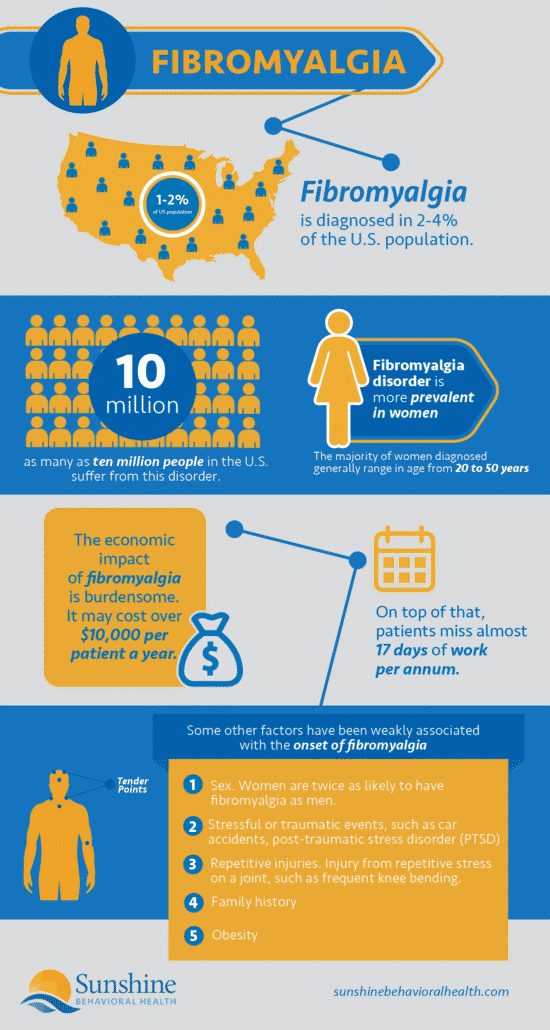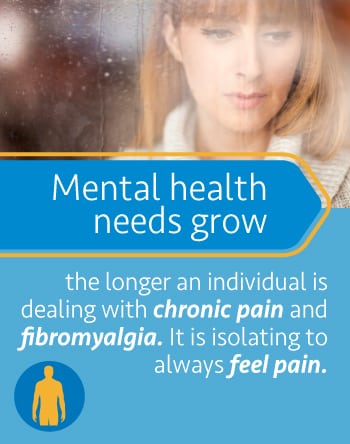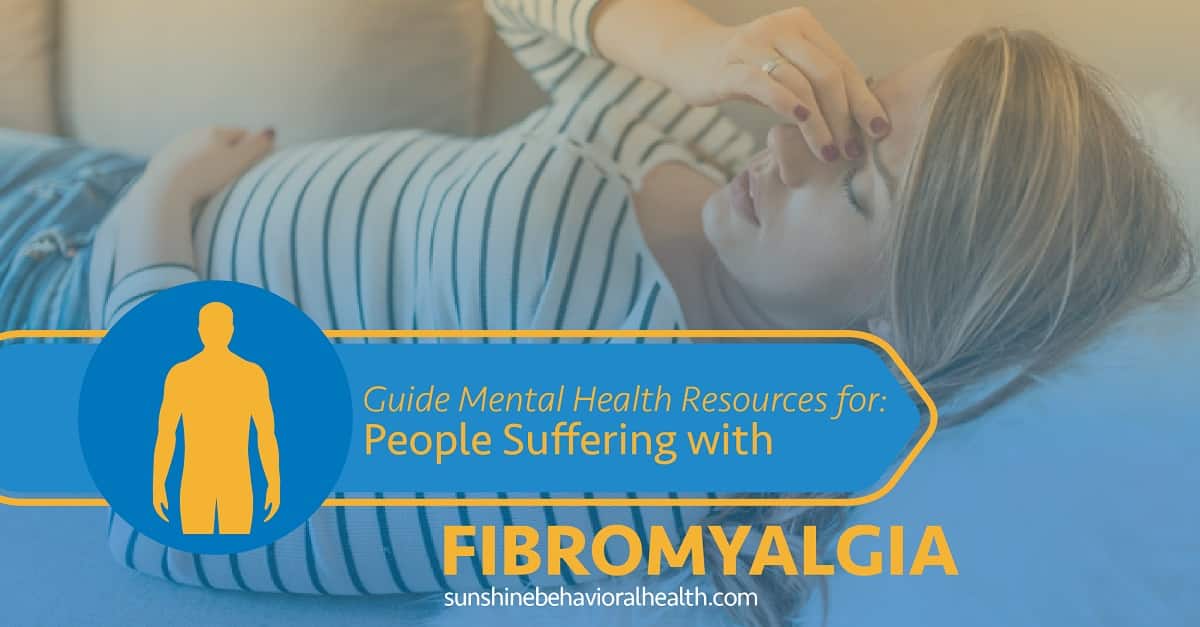Fibromyalgia can cause widespread pain throughout the body, and the pain is often worsened during times of stress. It is important for individuals diagnosed with fibromyalgia to seek mental health resources to better manage the condition. Roughly 2% of the adult population in the United States are diagnosed with fibromyalgia, according to the Center for Disease Control. As this is a condition without a cure, managing the disease through a variety of methods is necessary.
Mental Health Needs and Fibromyalgia
Fibromyalgia sufferers deal with a range of physical and emotional symptoms. The condition is diagnosed when the patient exhibits symptoms while eliminating other diseases. Problems with mental clarity are common, as are anxiety and depression. It is not always clear whether fibromyalgia is causing depression and anxiety, or if a person with underlying depression is more susceptible to fibromyalgia. Mental health needs and fibromyalgia are intricately linked, and it is important to identify ways to reduce stress and get support. Fibromyalgia can flare up during times of stress, leading to:
- Feelings of hopelessness and loneliness
- An exacerbation of the stress response
- Depression that makes it difficult to get through day-to-day
- Anxiety that disrupts thinking ability, sleep, and behavior patterns
The Anxiety and Depression Association of America reported that about 20% of those living with chronic pain are also diagnosed with anxiety or depression. The connection between pain conditions that are difficult to manage and mental health needs must be addressed in order to maximize the potential for better health.

Physical Symptoms Associated With Fibromyalgia
One of the most prevalent physical symptoms of fibromyalgia is widespread pain. In order to diagnose fibromyalgia, a physician will test a series of pressure points that are tender in the majority of fibromyalgia patients. There is no blood test for fibromyalgia, and diagnosing the condition involves identifying the set of symptoms while ruling out other illnesses. Physical symptoms of fibromyalgia may include:
- Extreme fatigue that interferes with daily life
- Pain in the neck, knees, upper back, or hips
- Pain that doesn’t have a clear cause and migrates throughout the body
- Muscle fatigue, twitching, and soreness
- Headaches that are chronic
- Sensitivity to temperature, weather changes, loud noises, or bright lights
The physical symptoms of fibromyalgia become worse when sleep is disrupted and anxiety or depression are present. In order to deal with the physical symptoms, it is necessary to manage the emotional changes that occur because of the condition. Fibromyalgia patients that get support for their mental health see an improvement in their overall symptoms.
Risk Factors Associated with Fibromyalgia
There is no specific cause of fibromyalgia, but there are risk factors associated with the condition. According to the Center for Disease Control and Prevention, further study needs to be done to fully identify all risk factors. At this time, certain risk factors include:
- A family history of fibromyalgia and autoimmune disease
- Being female, as women are diagnosed with fibromyalgia at twice the rate of men
- Experience with a traumatic event, accident, or a diagnosis of PTSD
- Hormonal changes
- Obesity
It is important to understand that even if a patient does not have any risk factors, the condition can be diagnosed. While obese women with a family history of fibromyalgia are more likely to have the diagnosis, men with no risk factors are also diagnosed. Your physician may do blood work to rule out other illnesses, and diagnose fibromyalgia only after considering other diseases.
Diagnosing Fibromyalgia
While patients may go through a trigger point exam to determine if certain pressure points are sensitive, new guidelines from the American College of Rheumatology now state that to diagnose fibromyalgia, pain must be present in four out of five areas for at least three months. Pain areas include:
- The Upper left area includes the shoulder, face, and arm
- The upper right area includes the shoulder, face, and arm
- The right lower area, that includes the buttock, leg, or hip
- The left lower area, that includes the buttock, leg, or hip
- Axial area, which may be the chest, stomach, neck, or back
The pain of fibromyalgia is widespread, persistent, and complicated to treat. Your physician will complete blood work to rule out other medical issues that could be causing your pain or other symptoms. A formal diagnosis of fibromyalgia may help individuals move forward with acceptance of the condition, and to learn more about it. Once a diagnosis is made, it becomes possible to develop a treatment plan that can target symptoms.
A fibromyalgia diagnosis is sometimes hard to accept. It is a condition that is not always visible, and it may feel as if the diagnosis is not real. This is why it is important to seek mental health treatment as part of a comprehensive fibromyalgia treatment plan. With a therapist in place, it becomes possible to optimize mental health while getting support for a complicated condition.
Misdiagnosing Fibromyalgia
Since there is no definitive test to help pinpoint Fibromyalgia, and it is identified by a set of symptoms, it can often be easy to discount if all of them are not present at one time. In fact, even if people have all of these symptoms, its still hard for doctors to diagnose. This is because so many of the signs overlap with other conditions. This causes many people to go years attending costly doctors appointments and seeing different specialists (e.g. rheumatologist), just to try to determine what is wrong with them.
The entire process can be very stressful and frustrating because one with Fibromyalgia (even undiagnosed), can feel that there is something wrong, however, doctors just cant give them an answer right away because it is always necessary to do exhaustive testing to rule out other conditions. Even worse, once a person does finally find out they have fibromyalgia, the stress and depression of having an incurable condition can be catastrophic for them.
Treatment For Fibromyalgia
The treatment for fibromyalgia is complex, as the condition itself presents any number of issues for the sufferer. Treatment focuses on managing the symptoms while trying to help the individual better manage their stress levels. Some medications may help reduce the severity of pain, especially during flare-ups from fibromyalgia. It is important to seek the care of a physician to discuss possible medication for treatment. Some people find symptom relief from over-the-counter pain relievers, while others are prescribed an anti-anxiety or anti-depressant medication in order to keep symptoms under control.
Talk therapy is often an integral part of any treatment plan for an individual dealing with fibromyalgia. Dealing with chronic pain and the uncertainty of fibromyalgia symptoms can lead to negative thought patterns and behaviors. A person who is exhausted may begin to think the fatigue will never end, which can cause a downward spiral of symptoms. Cognitive Behavioral Therapy, or CBT, is a common form of therapy used for people who are trying to deal with the physical and emotional impact of fibromyalgia.
The Struggle With Long-Term Symptoms of Fibromyalgia
 Fibromyalgia is a discouraging condition as it can be difficult to pinpoint the cause of pain, brain fog, or new symptoms that arise. An individual working hard to maintain a solid sleep pattern and good nutrition may have a fibromyalgia flare-up because of the weather. As barometric pressure can’t be controlled, there are days when fibromyalgia symptoms are worse despite the patient’s efforts to avoid a flare.
Fibromyalgia is a discouraging condition as it can be difficult to pinpoint the cause of pain, brain fog, or new symptoms that arise. An individual working hard to maintain a solid sleep pattern and good nutrition may have a fibromyalgia flare-up because of the weather. As barometric pressure can’t be controlled, there are days when fibromyalgia symptoms are worse despite the patient’s efforts to avoid a flare.
Mental health needs grow the longer an individual is dealing with chronic pain and fibromyalgia. It is isolating to always feel pain, and the person usually doesn’t talk much to peers about the condition. For those that don’t have fibromyalgia, it is hard to understand the depth to which the person is suffering. While some days may be normal, other days the individual struggles to get out of bed.
The connection between fibromyalgia symptoms and stress levels is clear. For those who have fibromyalgia and don’t deal with mental health issues, the condition is often more disabling. It is useful to seek help to find peers who have fibromyalgia in order to talk about the experience of having a condition that is tough to diagnose.
When stress levels improve, fibromyalgia symptoms are often decreased.
Therapies for Fibromyalgia
Treatment for fibromyalgia is varied and will depend on the symptoms the individual is presenting. Some patients find that acupuncture is effective at decreasing pain and improving anxiety or depression. Acupuncture uses hair-thin needles in pressure points to correlate with the symptoms present. Acupuncture does not interfere with medication or other therapies, and it is a safe, complementary therapy for individuals with fibromyalgia.
Physical therapy can help improve the range of motion and decrease any inflammation that is within the joints. A physical therapist will do a careful evaluation to determine any therapies that can be provided to improve pain and range of motion issues.
Exercise is considered one of the top therapies to deal with fibromyalgia, along with talk therapy. It is important for individuals to exercise at their own capacity, and not push it too hard. While some exercise will improve sleep and decrease pain, too much exercise can lead to an increase in pain and an exacerbation of symptoms.
Dietary changes can have a positive impact on those suffering from fibromyalgia. Avoiding foods that cause inflammation, such as sugar, can lead to less pain and more regulated blood sugar levels. Good nutrition improves overall health, and those dealing with fibromyalgia see a benefit as they begin to eat more fruits, vegetables, and lean proteins while staying away from processed food.
Understanding CBT and the Importance of Talk Therapy for Fibromyalgia
CBT gives patients more hope by helping to change negative thought patterns that emerge when dealing with chronic pain conditions. The lack of a cure for fibromyalgia leads some patients to give up on trying to improve their health. Cognitive Behavioral Therapy helps the patient focus on managing symptoms and improving the attitude they have about the situation they are in. CBT has been proven to be equal to medication when it comes to treating fibromyalgia.
In one study published on PubMed, the impact of CBT on fibromyalgia was studied. It was concluded that CBT provided a small benefit over the interventions used in the control groups to improve fibromyalgia symptoms. At the end of treatment and follow-up appointments, patients reported pain reduction, improved mood, and less disability than control groups.
Cognitive Behavioral Therapy looks at thoughts that are negative in an effort to change the thoughts into more productive ones. A skilled CBT clinician will identify thought patterns that are destructive to the healing process in order to move forward to change these thoughts. The person in therapy will talk about what is going on in their life and how they feel about their condition.
Mindfulness and Symptom Management for Fibromyalgia
There is often a mindfulness component to CBT, as learning how to focus on the moment is beneficial for those trying to improve their outlook. Mindfulness is a form of meditation that is used to improve the mind and body connection. Through the use of guided imagery exercises, breathing techniques, and other relaxation strategies, one can experience stress reduction and improved mood. For those suffering from fibromyalgia, this meditation can help control pain by listening to the body and not over-reacting to the pain. Meditation helps people stay present, without getting overwhelmed about the things that can’t be controlled.
Mindfulness is effective at reducing anxiety, improving depression, and decreasing pain. For fibromyalgia sufferers, it is important to learn ways to meditate and decrease the stress response. This strategy can make it easier to focus, and accept what is happening at the moment.
Mental Health Resources for People Suffering From Fibromyalgia
Anxiety and Depression Association of America
The Anxiety and Depression Association of America began in 1979, and it is now an international agency that strives to help clients find the mental health treatment they want when they are dealing with anxiety, depression, and other mental health struggles. Those with fibromyalgia can find treatment providers for specific concerns, and the association provides a number of benefits to include:
- Additional resource links to learn more about fibromyalgia
- Find a Therapist Resource Page
- Educational articles about fibromyalgia, treatment, symptoms, and causes
- Webinars to learn about anxiety, depression
- Support groups for members who sign up for a membership
National Fibromyalgia and Chronic Pain Association
The National Fibromyalgia and Chronic Pain Association is a non-profit agency committed to helping those suffering from chronic pain and fibromyalgia through awareness, education, and collaboration. One goal is to minimize the impact of chronic disease through early detection, treatment, and the advancement of science to find a cure.
- Find a Medical Provider that Specializes in Fibromyalgia Resource Page
- Fibromyalgia Support Group Search Page
- Educational material about fibromyalgia
- Advocacy for those impacted by chronic pain and fibromyalgia
- Diet, activity, and lifestyle advice for those dealing with fibromyalgia
The American Fibromyalgia Syndrome Association
The main goal of the American Fibromyalgia Syndrome Association is to fund research to improve the quality of life for those that have fibromyalgia. It is a resource where individuals and professionals can learn more about fibromyalgia, and projects that have been funded by the association.
It is important to find a treatment team that understands the varied needs of a person with fibromyalgia. While the condition can’t be cured, symptoms can be controlled with the right interventions. Through mental health treatment that reduces stress, it is possible to gain control over the symptoms that fibromyalgia causes. Learn about the various lifestyle changes many fibromyalgia sufferers benefit from, and begin living life with the right support.
Sources
Medical disclaimer:
Sunshine Behavioral Health strives to help people who are facing substance abuse, addiction, mental health disorders, or a combination of these conditions. It does this by providing compassionate care and evidence-based content that addresses health, treatment, and recovery.
Licensed medical professionals review material we publish on our site. The material is not a substitute for qualified medical diagnoses, treatment, or advice. It should not be used to replace the suggestions of your personal physician or other health care professionals.








